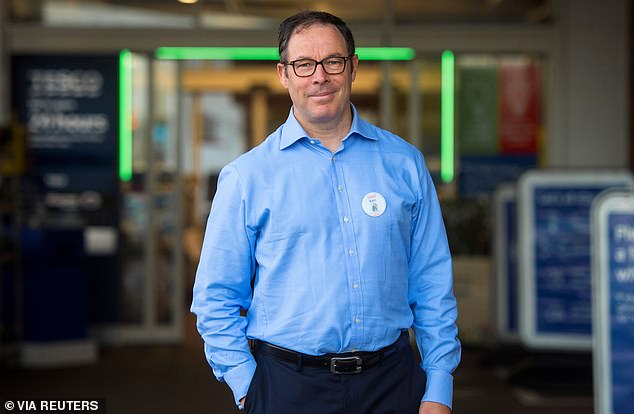Enough is enough is one of those glorious, no-nonsense old English expressions which says it all.
So bravo to Ken Murphy for venting his frustration with his ‘enough is enough’ warning to Rachel Reeves to stop walloping businesses with higher taxes in the forthcoming Budget.
The boss of Tesco went further, warning the Chancellor that if retailers are punished again with higher taxes on November 26, there will be an inevitable rise in food prices and the cost of living.
Customers, he said, are already holding back on the usual pre-Christmas shopping ahead of the Budget because they are so nervous about the future.
They are not the only ones: the latest Bank of England survey shows that UK firms have cut jobs for the fourth consecutive month, while many business leaders report they are facing the most dire economic outlook since the pandemic in 2020.
To date Tesco – along with many other supermarkets – has done its best to absorb the additional operating costs imposed at last year’s Budget.

Plea: Tesco chief exec Ken Murphy (pictured) has urged the Chancellor to deliver a ‘pro-growth and pro-jobs’ Budget
As Murphy pointed out when announcing half-year profits yesterday, Tesco has already taken on board higher employer National Insurance Contributions of £235million, as well as a new packaging levy that will cost it £90m this year.
For the most part, Tesco has taken a hit to profits with these higher costs. At the same time, the supermarket has cut the price of 6,500 items by an average of 9 per cent in an intense price-match war with rivals such as Aldi, and the success of savings with Clubcard.
Indeed, the rate of inflation of Tesco products is ‘well behind’ the latest 4.9 per cent headline rate for groceries according to consumer data firm Worldpanel.
But Murphy warned that keeping a lid on future prices will be difficult if Reeves goes ahead with threatened tax hikes, such as higher business rates for the bigger supermarkets.
In other words, he said, don’t make it harder for us to deliver value and keep down prices.
Despite the cut-throat competition, Tesco had a good half-year, with market share up again to 28.4 per cent and sales rising 5 per cent boosted by spending on barbecues during the fine weather.
Tough times mean shoppers are already changing habits to save money. Rather than going out to eat, customers are buying more premium ready-meals from the Finest range, which has seen double-digit growth for the third year, as well as more fresh fruit and veg to cook at home.
Pre-tax profit fell back by 6.3 per cent to £1.3billion, mainly because of restructuring costs, the separation of its banking division, as well as investment in keeping prices down.
Even so, Tesco has upgraded its full-year profit forecast by £100million to £3.1billion, prompting criticism from unions that it is profiteering from the cost of living crisis and paying out ‘whopping’ dividends to shareholders.
They should remember: profit margins at Tesco at 4.3 per cent are super slim, the corporation tax it pays helps to keep the public sector alive and a big chunk of those dividends go towards staff pensions.
Signs of life
Signs of a return to life or a temporary artificial intelligence twitch?
Who knows, but the dual listing of electric grid and data centre developer Fermi on Nasdaq and the London Stock Exchange at more than $13billion (£9.7billion) has certainly brought out the bubbly at Paternoster Square.
And the timing is a godsend, coming in the week that a global ranking of initial public offering markets showed that the LSE fell to below Mexico in 23rd place. Fermi is quite a catch for London and our AI experts.
The Texas company is planning to build 15m sq feet of AI data centre capacity, powered by a mix of natural gas, solar power, battery storage, and four nuclear reactors connected with a ‘HyperGrid’.
It is to be based at the Texas Tech University campus at Amarillo.
Known as Project Matador, the first power is due to come on stream next year. Let’s hope the bulls follow on.
Cyber beer
These cyber hackers know how to hurt a nation: M&S and Jaguar in the UK and beer in Japan.
Thirty of Asahi Group’s beer factories in Japan have stopped production after a cyber attack on Monday paralysed its ordering and delivery system.
Retailers are warning that they are running out of supplies of Japan’s favourite beer, Asahi Super Dry.
Just two days of stock left on the shelves.
DIY INVESTING PLATFORMS

AJ Bell

AJ Bell
Easy investing and ready-made portfolios

Hargreaves Lansdown

Hargreaves Lansdown
Free fund dealing and investment ideas

interactive investor

interactive investor
Flat-fee investing from £4.99 per month

InvestEngine

InvestEngine
Account and trading fee-free ETF investing
Trading 212
Trading 212
Free share dealing and no account fee
Affiliate links: If you take out a product This is Money may earn a commission. These deals are chosen by our editorial team, as we think they are worth highlighting. This does not affect our editorial independence.
This article was originally published by a www.dailymail.co.uk . Read the Original article here. .

